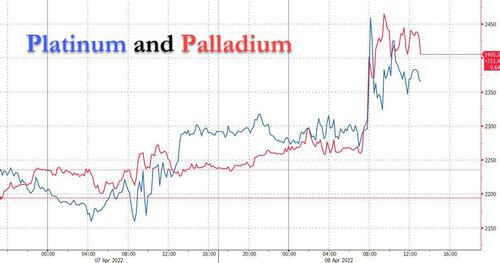First Russian gold and silver, then diamonds, now platnium and palladium.
On Friday, newly refined Russian platinum and palladium was suspended from trading in London, denying Russia access to the metals' biggest trade hub in the latest in a growing list of measures against Russian interests because of the conflict in Ukraine. Of course, the Russian physical metal ban also means that commodity traders will now have to buy much more for physical - not paper - metal.
The London Platinum and Palladium Market (LPPM), an industry association, said the situation in Ukraine prompted it to review its list of "good delivery" refiners accredited to deliver metal into the London trading system. The LPPM said it would suspend with immediate effect both Russian refiners on its list, JSC Krastsvetmet and the Prioksky Plant of Non-Ferrous Metals.
The suspension blocks platinum and palladium produced by these refiners after April 8 from trading in London, though products they made while accredited remain eligible to trade, the LPPM said.
The decision comes a month after a similar industry group, the London Bullion Market Association (LBMA), suspended the accreditation of Russian refiners, blocking new Russian gold and silver from London.
Prices of palladium surged as much as 11%, with traders fearing the move could worsen a shortage of the metal automakers use in exhaust pipes to reduce emissions.

Just how reliant is the world on Russian metals? Russia's Norilsk Nickel produces 25-30% of the world's palladium supply and about 10% of platinum, which is also used to curb vehicle emissions as well as in other industries and to make jewellery. The company's website says that it sends metals to Krastsvetmet, Prioksky and another refinery, Uralintech, for refining.
A source close to Nornickel said the LPPM decision would restrict its ability to sell to banks but sales to manufacturers, which form the bulk of its business, would be unaffected. However, speaking to Reuters, industry sources in London said the move increases pressure on manufacturers to reject Russian platinum and palladium similar to what happened with Russian oil, which just means even higher prices.
Indeed, recyclers and miners in South Africa and North America, the other main producers, stand to benefit from any boycott of Russian material.
The European Union on Friday adopted its fifth package of sanctions, including bans on the import of coal, wood, chemicals and other products. EU governments have also frozen about 30 billion euros ($32.6 billion) of assets linked to oligarchs and other sanctioned people with ties to the Kremlin.
On Friday, newly refined Russian platinum and palladium was suspended from trading in London, denying Russia access to the metals' biggest trade hub in the latest in a growing list of measures against Russian interests because of the conflict in Ukraine. Of course, the Russian physical metal ban also means that commodity traders will now have to buy much more for physical - not paper - metal.
The London Platinum and Palladium Market (LPPM), an industry association, said the situation in Ukraine prompted it to review its list of "good delivery" refiners accredited to deliver metal into the London trading system. The LPPM said it would suspend with immediate effect both Russian refiners on its list, JSC Krastsvetmet and the Prioksky Plant of Non-Ferrous Metals.
The suspension blocks platinum and palladium produced by these refiners after April 8 from trading in London, though products they made while accredited remain eligible to trade, the LPPM said.
The decision comes a month after a similar industry group, the London Bullion Market Association (LBMA), suspended the accreditation of Russian refiners, blocking new Russian gold and silver from London.
Prices of palladium surged as much as 11%, with traders fearing the move could worsen a shortage of the metal automakers use in exhaust pipes to reduce emissions.

Just how reliant is the world on Russian metals? Russia's Norilsk Nickel produces 25-30% of the world's palladium supply and about 10% of platinum, which is also used to curb vehicle emissions as well as in other industries and to make jewellery. The company's website says that it sends metals to Krastsvetmet, Prioksky and another refinery, Uralintech, for refining.
A source close to Nornickel said the LPPM decision would restrict its ability to sell to banks but sales to manufacturers, which form the bulk of its business, would be unaffected. However, speaking to Reuters, industry sources in London said the move increases pressure on manufacturers to reject Russian platinum and palladium similar to what happened with Russian oil, which just means even higher prices.
Indeed, recyclers and miners in South Africa and North America, the other main producers, stand to benefit from any boycott of Russian material.
The European Union on Friday adopted its fifth package of sanctions, including bans on the import of coal, wood, chemicals and other products. EU governments have also frozen about 30 billion euros ($32.6 billion) of assets linked to oligarchs and other sanctioned people with ties to the Kremlin.

